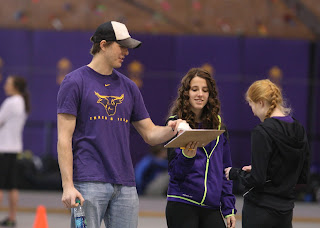 |
| Jim Dilling is in his third year as head coach of the Minnesota State men's track & field program |
Most people view injuries as a setback in their athletic
careers. Third-year Minnesota State men’s track and field coach, Jim Dilling, on the other hand is not
like most people.
Following a successful high school athletic career in Fond du Lac, Wis., Dilling ventured to southern Minnesota looking to play football for the Mavericks.
He left Mankato five years later a four-time NCAA Division II national champion in the high jump and in 2007 finished atop the field at the U.S.A Track & Field Outdoor national championships. In doing so he represented his country at the 2007 World Championship where he posted a 16th-place finish in Osaka, Japan.
Dilling’s journey, which eventually led to his current position leading the Maverick men’s track and field program is an interesting one.
It all started during Dilling’s freshman orientation when track and field coach and Minnesota State Hall of Fame inductee, Mark Schuck, tried to convince him to come out for track instead of football.
“Mark had tried to get me to come out when I had met him at orientation as an incoming freshman, but at the time I wasn't too interested as I doubted my ability to compete collegiately as a high jumper," said Dilling. "With a 6'6" high school personal best, I wasn't sure what progressions were possible in the event,"
Unfortunately or fortunately, depending how you want to look at it, Dilling’s life changed forever after his decision to give up football and pursue track and field after two broken collar bones which occurred during football workouts. Not only did this decision allow him to have great success as an athlete, but unknowingly, also set him up to become the school’s next men’s track and field coach.
Schuck had a feeling that Jim could be a special high jumper. He didn’t know how easy it would be to coach him. “He’d listen to an old lady on the street if it helped him become a better high jumper,” said Schuck. “Having been a student athlete here myself, I can relate on an extremely personal level with members of my team. I understand the demands of the sport and the commitment levels necessary to be successful in the classroom. The key is proper balance with priorities and that is where being an alumni of this program holds real value, because they know that you have been there before.”
Dilling, who established an NCAA DII indoor record when he leapt 7-6 in 2006 and following his career as a world class high jumper (he finished 11th at the 2008 Olympic Trials and spent time competing internationally), returned to Minnesota State where he served as a graduate assistant and an assistant coach on Schuck’s staff. Schuck retired following the conclusion of the 2012-13 school year and Dilling was named head coach of the program that August.
Under Dilling’s leadership the program achieved its first #1 ranking in a national poll last year. And, under his leadership, the Mavericks are beginning to attract a strong stable of high jumpers. Currently five Mavericks rank in the top 25 for Division II. No other team has more than one.
Philosophically, being successful is rewarding for Dilling, but it is not the most important thing. “Helping others learn to harness their own ability and reach their true potential is more rewarding than any accolade one can achieve on their own,” said Dilling, who at 6’ 5” towers over most people.
“People frequently ask me if I miss competing in the sport. Not at all because to me I still am competing each and every day with myself to make these young men and women better than they were the day before.”
Schuck believes Dilling is the perfect coach for the Mavericks. “Jim has all the ingredients to be a great coach. He’s very knowledgeable, personable, and most importantly his relationship building is
phenomenal.”
-
contributed by Jesse Larson, Athletic Communications intern






